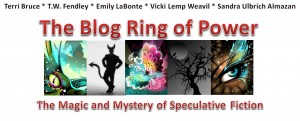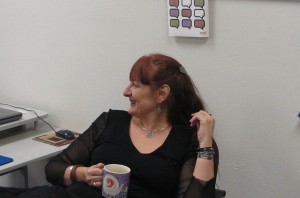Blog Ring of Power Presents: Katherine Lampe
Welcome to this week’s Blog Ring of Power guest, Katherine Lampe. When she was twelve years old, Katherine was thrown out of Sunday School class by her minister father for advancing a symbolist interpretation of the story of the expulsion from Eden. This marked the beginning of her career as an Iconoclast, which she pursues on a daily basis by asking difficult questions until people run away in terror. As a writer, she is a staunch proponent of the Independent movement and is outspoken against the sexism, classism, and narcissism often found in traditional publishing. HerCaitlin Ross series of paranormal novels follow the adventures of a witch married to a shaman in Colorado, and explore problems ranging from abuse of power to dysfunctional families. The fifth in the series, The Cruel Mother, was released in September, 2013, and Katherine is currently working on the sixth, to be titled Demon Lover.

Part 1 @ T. W. Thursday, October 10
Part 2 @ Welcome to the Realm - Friday, October 11
Part 3 @ Sandra - Monday, October 14
Part 4 @ Vicki - Tuesday, October 15
Part 5 @ Terri – Wednesday, October 16
Section Two:
The Writing Life
What is
your writing process? Do you follow a regular routine? Do you use pen and paper
or computer? Work at home or at the library/Starbucks, etc.
I have a tiny purple office in the back of our
house, with a rather lovely desktop on a cheap computer desk from Wal-Mart.
Also, a shrine to my particular household gods, like Batman and Yoda, and a
fellow whom it’s better not to mention by name, because that can get awkward. I
write almost exclusively on the computer. I say “almost,” because I do write
sticky notes to myself, generally things that pop into my head at inconvenient
times, like when I’m eating dinner or sitting on the toilet. “The cabby has
been to the magic store,” or “Aconite, asafoetida, and hemlock.”—stuff like
that. I used to write longhand, but that’s become impossible because my mind
just goes too fast and pen and paper just can’t keep up. I get frustrated and
distracted and start thinking of what I want to do when this frustrating thing
is over, and nothing is accomplished. Working in my office, at my desk, gives
me a certain amount of structure in that it’s easier to turn off the writer’s
mind when I leave the office; that can be a real problem for me if I carry my
writing all over the place. And the computer makes it very convenient to pop
onto the Internet for spontaneous research if I get curious about something.
But the spatial thing, that’s really the only
routine I have. I’m very bad at routine. When I have a story going I write.
When I don’t, no amount of routine or forcing myself to write is going to help.
In fact, it’s hurtful. So I allow myself to be who I am and follow my own
pattern, not someone else’s.
When I do
have a story going, my day looks like this: After “doing the morning thing,”
which involves sitting on the couch and staring into space while the coffee
takes effect, having breakfast, forcing myself to participate in some kind of
physical activity, etc., I open up whatever document I’m working on. I keep
separate documents for each chapter, because I find that easier to deal with. The
first thing I do is re-read what I did the day before, because that’s when I
have a fresh eye and can add bits and pieces of body language and expression
that might have got left out, or change strange or repetitive words. (This is a
process that continues on and off pretty much up until publication.) Then I go
on, just getting words down. If I get stuck I get up and walk around the house
or go to a different room. But as long as I’m “working”—i.e., involved in my
working day—I have a difficult time letting
it go until I’m done for the day.
How do you
balance writing with other aspects of your life?
Well, I could say “Very badly,” or I could say,
“What other aspects of my life?” But neither of those things would be entirely
true. Although, in a real way writing IS my life. The stories, the characters,
have a veracity and importance for me that other things fail to achieve.
But I suppose what you want to know is more about
time management. I don’t have much difficulty with it. Partly this is because
my life has thrown me some…I hate to call them advantages. I have a disability
that makes it impossible for me to hold down a job in the outside world. So I
don’t have that conflict. And it’s a good thing, because when I was trying to
be that normal person I couldn’t write at all and it nearly destroyed me. I
have no idea how some people you hear about work 40 hours a week in some office
and then come home and write their novels. I simply can’t do it.
I don’t have any kids, unfortunately, so I don’t
have the same demands of family as other people. And I’m a terrible
housekeeper. I don’t think I’ve mopped the kitchen since the Fourth of July. I
do laundry, but that’s not much of a conflict: just pop a load in while I’m
wandering around thinking of something else and get back to the desk.
Everything else can wait. Oh, and I’m super introverted. I could happily not
leave my house for months at a time. So it’s not like writing takes away from a
fantastic social life, or anything like that.
When do you
write?
Depends. Most weekdays, except Fridays (because my
husband has Fridays off), and often Saturdays. I generally start around
ten-thirty or eleven in the morning and quit around four in the afternoon. But
if it’s going really well, or if there’s something I very much want to get
down, I’ll go back to it in the evenings or start earlier. When I was writing A Maid in Bedlam, the third Caitlin Ross
book, I was spontaneously waking up at five every morning; I’d start writing
around seven, go until five in the evening, break for a couple hours, and go
back, sometimes until ten at night. And I did this seven days a week. It was
like my head was on fire. I think I got the entire first draft done in five
weeks—140K words—and it was all good enough that I had very little editing to
do. Sometimes it’s like that.
What is the
strongest criticism you’ve ever received as an author? The best compliment?
Strongest? I honestly can’t think of any
mind-blowing criticism, other than the critique of the beginning of a fantasy
novel I got from a friend, who wrote me a ten-page screed dissing my manuscript
because it wasn’t the book she would
have written. I hate it when people do that: fail to see your story, with all its good and bad, because they’re going into
it with the expectation of some other story in their heads.
The weirdest criticism I ever got was from Gardner
Dozois, from The Magazine of Science
Fiction and Fantasy. He was soliciting humorous stories, so I sent him
something that I’d read out a lot and that inevitably had the audience rolling
in the aisles. It was called “Some Dang Alien Thing,” and it was about this
crotchety old guy in a rural area saving his neighbors from being abducted by
aliens. Well, I got a rejection letter back, and it wasn’t the typical “This doesn’t
suit our needs at this time” kind of thing. It was actually from Mr. Dozois,
saying that he didn’t understand why my story was funny. To this day, I have no
idea how he could have missed it. Everyone else who’s read it says it’s the
funniest thing I’ve ever written.
And—this is probably going to sound cheesy, but
it’s true—the best compliment I get is just people telling me they enjoy my
stories. I can never hear that enough.
How do you
deal with rejection and/or negative reviews?
This is very difficult for me. I haven’t had to
deal with many negative reviews, fortunately—since I’ve put my work out there,
it seems everyone who actually reads it likes it. But rejection is hard.
Especially since all I’ve ever wanted to do is write, it gets very personal for
me. Getting a rejection, it’s like being told I can’t be who I am, can’t have
the life I want and it’s completely out of my control. So, I have the habit of
going into a really bad depression and giving up on writing for days or months
or years, which I would not recommend to anyone as a coping mechanism. It’s
part of the reason I decided to take my work Independent, actually. Doing that
over and over was killing me. And since I consciously took myself out of that
cycle, I’ve become more and more aware of how damaging it is (which I’ll be
talking about more in a different part of this interview).
I guess, in the end, I dealt with rejection by
using it to motivate me to make a positive change in the way I approached my
work. And that’s a good thing.
 THE CRUEL MOTHER: When Caitlin Ross was fifteen, her mother had her committed to a mental institution in hopes of curing her of magic. After a sympathetic psychiatrist helped Caitlin secure her release, she left her family, and ever since she has kept as much distance between herself and them as possible.
THE CRUEL MOTHER: When Caitlin Ross was fifteen, her mother had her committed to a mental institution in hopes of curing her of magic. After a sympathetic psychiatrist helped Caitlin secure her release, she left her family, and ever since she has kept as much distance between herself and them as possible.
But when her sister calls to tell Caitlin her mother is dying, she yearns for some kind of reconciliation and chooses to return to her childhood home. In Detroit, Caitlin runs into her former psychiatrist, who asks for her help with one of his patients, a troubled teenaged girl. Although Caitlin at first refuses to get involved, escalating family tensions drive her to visit the girl as an escape. Discovering the source of the girl’s problems will lead Caitlin into a world she’s only imagined, one that holds a startling revelation about her own origins.
Website: http://www.katherinelampe.com is my
official website, but I actually am terrible at keeping it up. If anyone wants
to take on web design, please contact me!
Facebook
page: https://www.facebook.com/KELampe
Goodreads
author page: http://www.goodreads.com/author/show/2707900.Katherine_Lampe
Twitter: https://twitter.com/wysewomon
What format
is your book(s) available in (print, e-book, audio book, etc.)?
All my books are available in both print and electronic
format.




Comments
Post a Comment